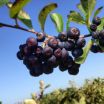(Press-News.org) A wild berry native to North America may strengthen the effectiveness of a chemotherapy drug commonly used to treat pancreatic cancer, reveals research published online in the Journal of Clinical Pathology.
The study by researchers at King's College Hospital and the University of Southampton suggests that adding nutraceuticals to chemotherapy cycles may improve the effectiveness of conventional drugs, particularly in hard to treat cancers, such as pancreatic cancer.
The team tested the effectiveness of extract of chokeberry (Aronia melanocarpa) in killing off cancer cells, probably by apoptosis (programmed cell death) as markers of early apoptosis appear in treated cells.
Chokeberry is a wild berry that grows on the eastern side of North America in wetlands and swamp areas. The berry is high in vitamins and antioxidants, including various polyphenols—compounds that are believed to mop up the harmful by-products of normal cell activity.
The researchers chose to study the impact of the extract on pancreatic cancer, because of its persistently dismal prognosis: less than 5 per cent of patients are alive five years after their diagnosis.
The study used a well-known line of pancreatic cancer cells (AsPC-1) in the laboratory and assessed how well this grew when treated with either the chemotherapy drug gemcitabine or different levels of commercially available chokeberry extract alone, and when treated with a combination of gemcitabine and chokeberry extract.
The analysis indicated that 48 hours of chokeberry extract treatment of pancreatic cancer cells induced cell death at 1 ug/ml.
The toxicity of chokeberry extract on normal blood vessel lining cells was tested and found to have no effects up to the highest levels used (50 ug/ml), suggesting that the cell death effect is happening in a way other than through preventing new blood vessel formation (anti-angiogenesis), a process that is important in cancer cell growth.
Bashir Lwaleed, at the University of Southampton, comments: "These are very exciting results. The low doses of the extract greatly boosted the effectiveness of gemcitabine, when the two were combined. In addition, we found that lower doses of the conventional drug were needed, suggesting either that the compounds work together synergistically, or that the extract exerts a "supra-additive" effect. This could change the way we deal with hard to treat cancers in the future. "
The team believe that more clinical trials are now needed to explore the potential of naturally occurring micronutrients in plants, such as those found in chokeberry.
Similar experimental studies, indicating that chokeberry extract seems to induce cell death and curb invasiveness in brain cancer, as well as other research, highlighting the potential therapeutic effects of particular polyphenols found in green tea, soya beans, grapes, mulberries, peanuts and turmeric, show potential, Dr Lwaleed adds.
Dr Harcharan Rooprai, King's College Hospital, comments: "The promising results seen are encouraging and suggest that these polyphenols have great therapeutic potential not only for brain tumours but pancreatic cancer as well."
INFORMATION:
The study was funded by The Ministry of Higher Education, Malaysia and Have a Chance Inc, USA.
Wild berry extract may strengthen effectiveness of pancreatic cancer drug
2014-09-18
ELSE PRESS RELEASES FROM THIS DATE:
Violence rates can be halved in just 30 years, say leading experts
2014-09-18
New evidence will be presented at the first Global Violence Reduction Conference in Cambridge this week which shows that homicide rates have been declining since the mid-1990s in many parts of the world - in some cases dramatically.
Nations as diverse as Estonia, Hong Kong, South Africa, Poland, and Russia have seen average recorded homicide rates drop by 40% or more in the course of just 15 years. Out of 88 countries where trend data could be found, 67 showed a decline and only 20 showed an increase between 1995 and 2010, a new analysis of data from the United Nations ...
The Lancet Haematology: PET-CT predicts lymphoma survival better than conventional imaging
2014-09-18
Positron emission tomography/computed tomography (PET-CT) is more accurate than conventional CT scanning in measuring response to treatment and predicting survival in patients with follicular lymphoma, and should be used routinely in clinical practice, according to new research published in The Lancet Haematology.
"Our findings have important implications for patients with follicular lymphoma, a common and usually slow-growing lymphoma. Compared to conventional CT scanning, PET-CT is more accurate in mapping-out the lymphoma, and better identifies the majority of patients ...
Peacock's train is not such a drag
2014-09-18
The magnificent plumage of the peacock may not be quite the sacrifice to love that it appears to be, University of Leeds researchers have discovered.
Dr Graham Askew, from the University's School of Biomedical Sciences, filmed five Indian peacocks taking off using two high-speed video cameras to try to work out what price male birds pay for carrying the spectacular iridescent feathers they use in displays to attract females.
"These feathers weigh about 300g and can exceed 1.5m, so it's expected that the male birds would be making a significant sacrifice in their flight ...
'Office life' of bacteria may be their weak spot
2014-09-18
Scientists at the University of Leeds think we may be able to drown deadly bacteria in their own paperwork.
A research team in the University's Astbury Centre for Structural Molecular Biology has identified for the first time how the "paper shredder" that keeps the bacteria E. coli on top of its day job works.
Now the group are looking for ways to jam the mechanism and leave E. coli and similar bacteria in filing hell.
Dr Kenneth McDowall, Associate Professor in Molecular Microbiology, who led the research, said: "If we block the 'shredder' using genetics in the ...
Space: The final frontier ... open to the public
2014-09-18
Historically, spaceflight has been reserved for the very healthy. Astronauts are selected for their ability to meet the highest physical and psychological standards to prepare them for any unknown challenges. However, with the advent of commercial spaceflight, average people can now fly for enjoyment. The aerospace medicine community has had very little information about what medical conditions or diseases should be considered particularly risky in the spaceflight environment, as most medical conditions have never been studied for risk in space — until now.
The aerospace ...
Nile River monitoring influences northeast Africa's future
2014-09-18
Curtin University research that monitors the volume of water in the Nile River Basin will help to level the playing field for more than 200 million North-East Africans who rely on the river's water supply.
Despite being arguably the longest river in the world, winding through nine different countries, the Nile River is shallow and has a low volume, making its water precious, particularly to those countries located downstream.
Curtin Associate Professor Joseph Awange, Department of Spatial Sciences, has been monitoring extractions or additions of water to the Nile River, ...
Kids eat better if their parents went to college
2014-09-18
Children of college-educated parents eat more vegetables and drink less sugar, according to a new study from the University of British Columbia. But it's still not enough, the study goes on to say, as all kids are falling short when it comes to eating healthier at school
The research suggests a parent's educational attainment, an indicator of socioeconomic status, may inform a child's diet.
The study found Vancouver school children whose parents completed some post-secondary education were 85 per cent more likely to eat vegetables during the school week than those with ...
Dogs can be pessimists too
2014-09-18
Dogs generally seem to be cheerful, happy-go-lucky characters, so you might expect that most would have an optimistic outlook on life.
In fact some dogs are distinctly more pessimistic than others, research from the University of Sydney shows.
"This research is exciting because it measures positive and negative emotional states in dogs objectively and non-invasively. It offers researchers and dog owners an insight into the outlook of dogs and how that changes," said Dr Melissa Starling, from the Faculty of Veterinary Science. Her PhD research findings are published ...
The viability of premature babies is minimal at 22 weeks' gestation
2014-09-18
A new study analyses the survival rates in Spain of newborns with a gestational age under 26 weeks. The results show that survival under 23 weeks is 'exceptional', although other factors such as birth weight and sex also have an influence.
Experts from the Spanish Society of Neonatology have studied the survival rates in Spain of newborns with a gestational age under 26 weeks, taking into account that a newborn carried to term is between 37 and 42 weeks.
The data have been drawn from the national database that gathers information on all babies born weighing less than ...
A second look at glaucoma surgery
2014-09-18
New research led by Queen's University professor Robert Campbell (Ophthalmology) has revealed using anti-inflammatory medications after glaucoma laser surgery is not helpful or necessary.
Glaucoma is the most common cause of irreversible blindness in the world and about 400,000 Canadians are afflicted with the disease, which is mainly caused by pressure within the eye being high enough to damage the optic nerve. The optic nerve is responsible for sending messages from the eye to the brain and is a vital part of vision.
"The use of strong anti-inflammatory therapies after ...

